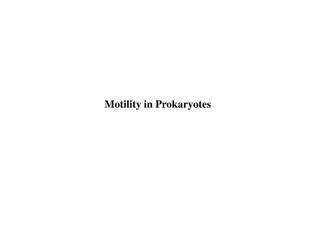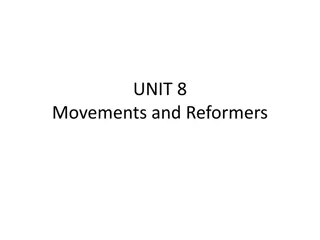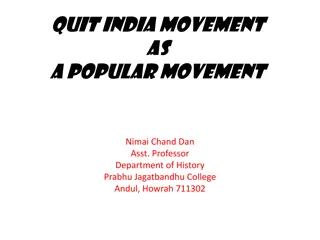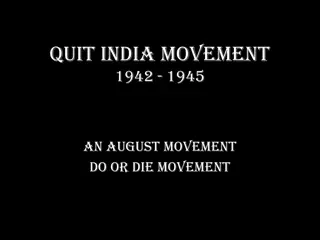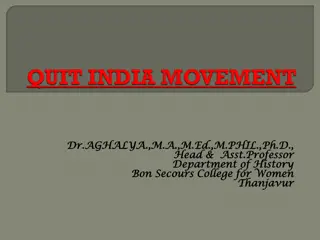The Oly Movement
The origins and principles of the Olympic Movement, promoting peace, unity, and equality through sport across nations. Learn about the Ancient Olympics in Greece and the Modern Olympics initiated by Baron de Coubertin.
Download Presentation

Please find below an Image/Link to download the presentation.
The content on the website is provided AS IS for your information and personal use only. It may not be sold, licensed, or shared on other websites without obtaining consent from the author.If you encounter any issues during the download, it is possible that the publisher has removed the file from their server.
You are allowed to download the files provided on this website for personal or commercial use, subject to the condition that they are used lawfully. All files are the property of their respective owners.
The content on the website is provided AS IS for your information and personal use only. It may not be sold, licensed, or shared on other websites without obtaining consent from the author.
E N D
Presentation Transcript
UNIT -1 THE OLY MOVEMENT
OLYMPIC MOVEMENT The Olympic Charter specifies that: The goal of Olympism is to place sport at the service of the harmonious development of humankind, with a view to promoting a peaceful society concerned with the preservation of human dignity. The goal of the Olympic Movement is to contribute to building a peaceful and better world by educating youth through sport practised in accordance with Olympism and its values. In Olympic sport, everyone is equal, irrespective of their background, gender, social status or beliefs. This principle of non-discrimination in sport allows the Olympic Games to promote peace and understanding among all people. Sport is one of the few areas of human activity that has achieved universal law. Regardless of where in the world we practise sport, the rules are the same: the 100- metre run is always the 100-metre run, wherever you are. The rules are based on universal values of fair play, respect and friendship, and they are recognized worldwide. The Olympic Movement is the concerted, organised, universal and permanent action, carried out under the supreme authority of the IOC, of all individuals who are inspired by the values of Olympism. It covers the five continents. It reaches its peak with the bringing together of the world s athletes at the great sports festival, the Olympic Games. Its symbol is five interlaced rings. The three main constituents of the Olympic Movement are the International Olympic Committee ( IOC ), the International Sports Federations ( IFs ) and the National Olympic Committees ( NOCs ).
ANCIENT OLY The ancient Olympic Games Latin: Olympia, were a series of athletic competitions among representatives of city-states and were Games of Ancient Greece. They were held in honor of Zeus, and the Greeks gave them a mythological origin. The originating Olympic Games are traditionally dated to 776 BC. The games were held every four years, or Olympiad, which became a unit of time in historical chronologies. Their last recorded celebration was in AD 393, under the emperor Theodosius he prizes for the victors were olive leaf or crowns. ancient Olympics had fewer events than the modern games, and only freeborn Greek men were allowed to participate, Artistic expression was a major part of the games. Sculptors, poets, painters and other artisans would come to the games to display their works in what became an artistic competition. Poets would be commissioned to write poems in praise of the Olympic victors.
MODERN OLY Baron Pierre de Coubertin, a French educator, is honored as the man who introduced the plan to revive the Olympics. Under his direction, the International Olympic Committee was formed in June of 1894. The Baron de Coubertin was heavily involved in all aspects of the Games inception and presided personally over the Olympic Committee for some 30 years. He is responsible for writing the Olympic Charter and Protocol, the Athletes Oath, and the guidelines for the opening and closing ceremonies of the Games.
The first edition of the modern Summer Games was held in 1896 in Athens (Greece), and the first Olympic Winter Games in 1924 in Chamonix (France). The word Olympiad designates the four-year period that separates each edition of the Summer Games. Until 1992, the Summer and Winter Games were held in the same year, but since then, the Winter Games were moved two years from the Summer Games. The Summer and Winter Games continue to be organised once every four years. The International Olympic Committee (IOC) uses icons, flags and symbols to elevate the Olympic Games. The Olympic flag was created in 1913 under the guidance of Baron de Coubertin of France. It was first hoisted in Alexandria, Egypt, at the 1914 Pan-Egyptian Games.The five rings on the flag represent the inhabited continents of the world. It was made to contain the colours (blue, black, red, yellow, and green) which are common to almost all flags around the world.[2]
The modern tradition of moving the Olympic flame via a relay system from Greece to the Olympic venue began with the Berlin Games in 1936. Months before the Games are held, the Olympic flame is lit on a torch, with the rays of the Sun concentrated by a parabolic reflector, at the site of the Ancient Olympics in Olympia, Greece. The torch is then taken out of Greece, most often to be taken around the country or continent where the Games are held. The Olympic torch is carried by athletes, leaders, celebrities, and ordinary people. On the final day of the torch relay, the day of the Opening Ceremony, the Flame reaches the main stadium and is used to light a cauldron situated in a prominent part of the venue to signify the beginning of the Games.
In 2000, in Sydney, for the first time, the oath specifically included a reference to doping. Since the Olympic Winter Games PyeongChang 2018, the athletes , officials and coaches oaths have been merged into one to save time during the ceremony. Each representative says their own part: In the name of the athletes , In the name of all judges or In the name of all the coaches and officials . The athlete then takes the following oath: We promise to take part in these Olympic Games, respecting and abiding by the rules and in the spirit of fair play, inclusion and equality. Together we stand in solidarity and commit ourselves to sport without doping, without cheating, without any form of discrimination. We do this for the honour of our teams, in respect for the Fundamental Principles of Olympism, and to make the world a better place through sport. .
The International Olympic Committee is a non-governmental sports organisation based in Lausanne, Switzerland. Founded in 1894 by Pierre de Coubertin and Demetrios Vikelas, it is the authority responsible for organising the modern (Summer, Winter, and Youth) Olympic Games. The IOC is the governing body of the National Olympic Committees (NOCs) and of the worldwide "Olympic Movement", the IOC's term for all entities and individuals involved in the Olympic Games. As of 2020, there are 206 NOCs officially recognised by the IOC. The current president of the IOC is Thomas Bach. The stated mission of the IOC is to promote Olympism throughout the world and to lead the Olympic Movement: To encourage and support the organization, development, and coordination of sport and sports competitions; To ensure the regular celebration of the Olympic Games;
To take action to strengthen the unity of the Olympic Movement, to protect its independence, to maintain and promote its political neutrality and to preserve the autonomy of sport; To act against any form of discrimination affecting the Olympic Movement; To encourage and support the promotion of women in sport at all levels and in all structures with a view to implementing the principle of equality between men and women; To protect clean athletes and the integrity of sport, by leading the fight against doping, and by taking action against all forms of manipulation of competitions and related corruption; To oppose any political or commercial abuse of sport and athletes; To encourage and support the development of sport for all; To promote a positive legacy from the Olympic Games to the host cities, regions and countries; To promote safe sport and the protection of athletes from all forms of harassment and abuse.

















